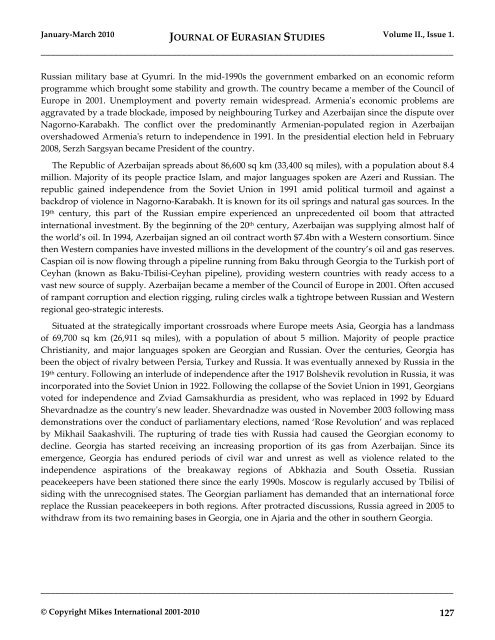EurasianStudies_0110..
EurasianStudies_0110..
EurasianStudies_0110..
You also want an ePaper? Increase the reach of your titles
YUMPU automatically turns print PDFs into web optimized ePapers that Google loves.
January-March 2010 JOURNAL OF EURASIAN STUDIES Volume II., Issue 1.<br />
_____________________________________________________________________________________<br />
Russian military base at Gyumri. In the mid-1990s the government embarked on an economic reform<br />
programme which brought some stability and growth. The country became a member of the Council of<br />
Europe in 2001. Unemployment and poverty remain widespread. Armenia's economic problems are<br />
aggravated by a trade blockade, imposed by neighbouring Turkey and Azerbaijan since the dispute over<br />
Nagorno-Karabakh. The conflict over the predominantly Armenian-populated region in Azerbaijan<br />
overshadowed Armenia's return to independence in 1991. In the presidential election held in February<br />
2008, Serzh Sargsyan became President of the country.<br />
The Republic of Azerbaijan spreads about 86,600 sq km (33,400 sq miles), with a population about 8.4<br />
million. Majority of its people practice Islam, and major languages spoken are Azeri and Russian. The<br />
republic gained independence from the Soviet Union in 1991 amid political turmoil and against a<br />
backdrop of violence in Nagorno-Karabakh. It is known for its oil springs and natural gas sources. In the<br />
19 th century, this part of the Russian empire experienced an unprecedented oil boom that attracted<br />
international investment. By the beginning of the 20 th century, Azerbaijan was supplying almost half of<br />
the world’s oil. In 1994, Azerbaijan signed an oil contract worth $7.4bn with a Western consortium. Since<br />
then Western companies have invested millions in the development of the country’s oil and gas reserves.<br />
Caspian oil is now flowing through a pipeline running from Baku through Georgia to the Turkish port of<br />
Ceyhan (known as Baku-Tbilisi-Ceyhan pipeline), providing western countries with ready access to a<br />
vast new source of supply. Azerbaijan became a member of the Council of Europe in 2001. Often accused<br />
of rampant corruption and election rigging, ruling circles walk a tightrope between Russian and Western<br />
regional geo-strategic interests.<br />
Situated at the strategically important crossroads where Europe meets Asia, Georgia has a landmass<br />
of 69,700 sq km (26,911 sq miles), with a population of about 5 million. Majority of people practice<br />
Christianity, and major languages spoken are Georgian and Russian. Over the centuries, Georgia has<br />
been the object of rivalry between Persia, Turkey and Russia. It was eventually annexed by Russia in the<br />
19 th century. Following an interlude of independence after the 1917 Bolshevik revolution in Russia, it was<br />
incorporated into the Soviet Union in 1922. Following the collapse of the Soviet Union in 1991, Georgians<br />
voted for independence and Zviad Gamsakhurdia as president, who was replaced in 1992 by Eduard<br />
Shevardnadze as the country's new leader. Shevardnadze was ousted in November 2003 following mass<br />
demonstrations over the conduct of parliamentary elections, named ‘Rose Revolution’ and was replaced<br />
by Mikhail Saakashvili. The rupturing of trade ties with Russia had caused the Georgian economy to<br />
decline. Georgia has started receiving an increasing proportion of its gas from Azerbaijan. Since its<br />
emergence, Georgia has endured periods of civil war and unrest as well as violence related to the<br />
independence aspirations of the breakaway regions of Abkhazia and South Ossetia. Russian<br />
peacekeepers have been stationed there since the early 1990s. Moscow is regularly accused by Tbilisi of<br />
siding with the unrecognised states. The Georgian parliament has demanded that an international force<br />
replace the Russian peacekeepers in both regions. After protracted discussions, Russia agreed in 2005 to<br />
withdraw from its two remaining bases in Georgia, one in Ajaria and the other in southern Georgia.<br />
_____________________________________________________________________________________<br />
© Copyright Mikes International 2001-2010 127

















